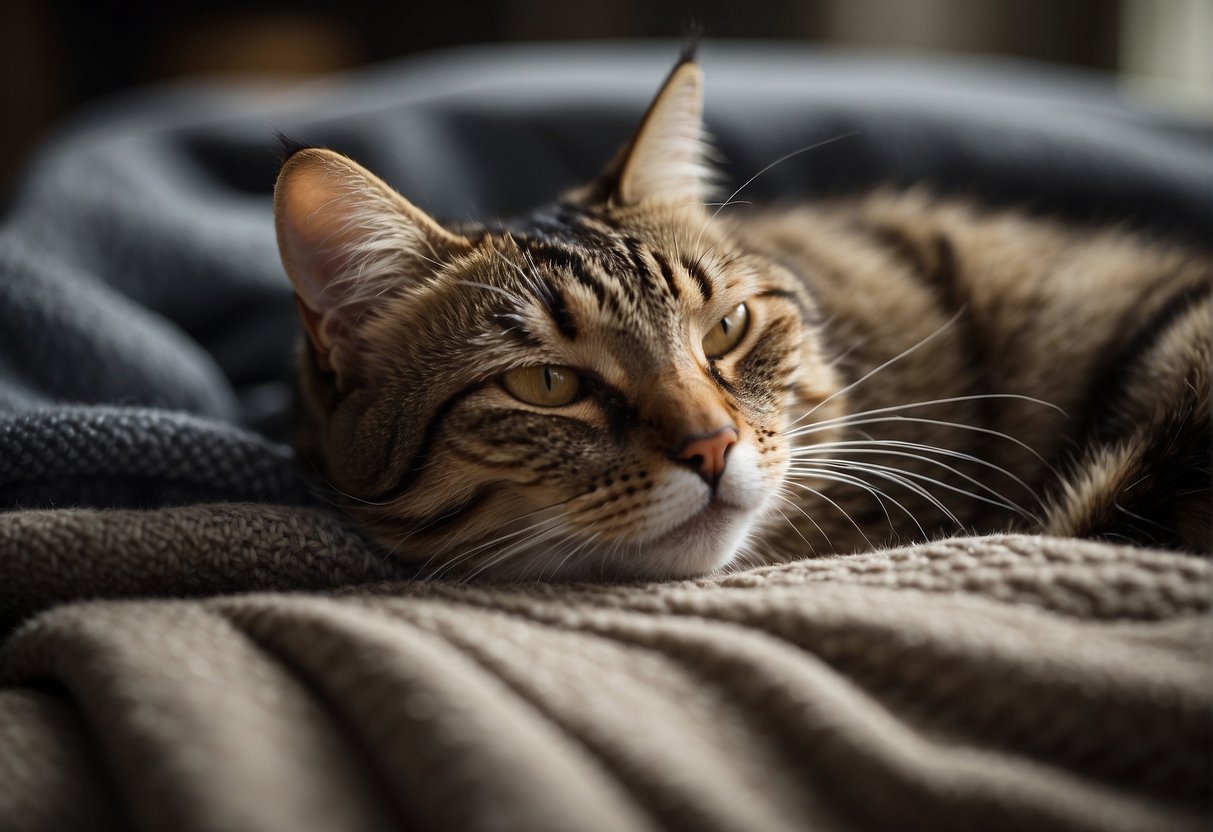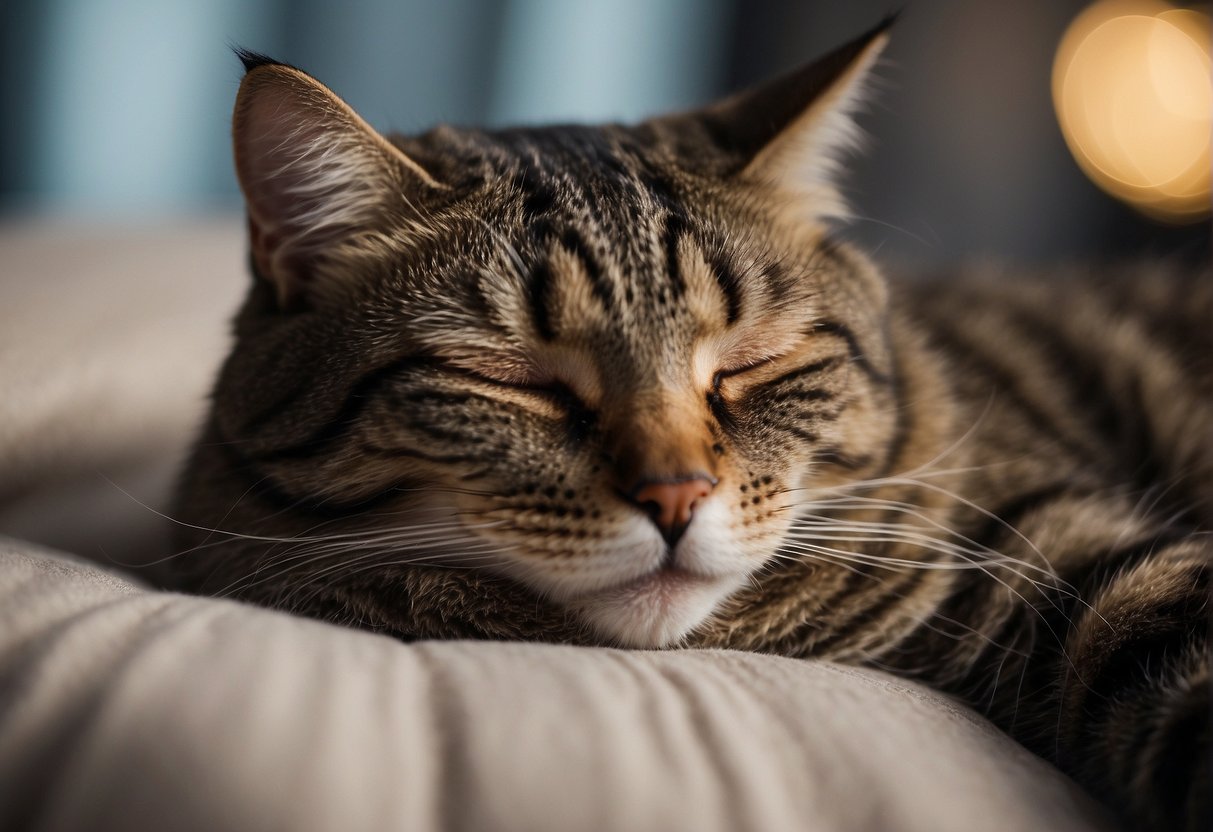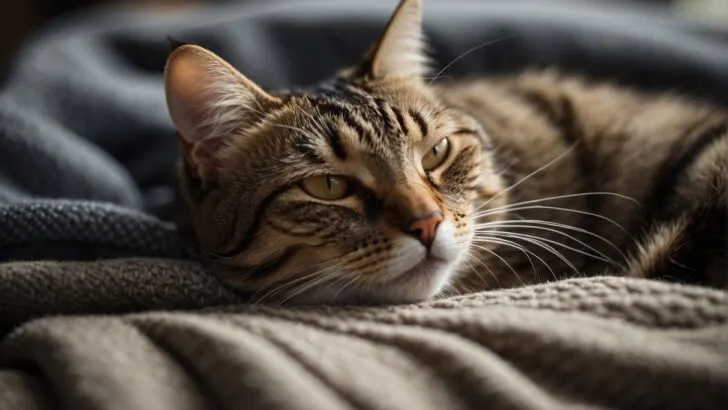Having owned my cat Harley for years, I can definitely confirm that cats can indeed snore, and it’s quite a common phenomenon among our feline friends. You might have noticed the gentle purr turning into a soft snore as your cat naps in a sunbeam.
Snoring in cats typically happens when they’re in a deep sleep, and their relaxed state can lead to the slight vibration of their soft palate. I’ve observed this myself when my cat finds the coziest spot on the couch after a busy day of bird watching and begins to doze off.

Not all cat snores indicate a peaceful slumber, though. At times, snoring may result from a cat being overweight, similar to how weight can affect snoring in humans.
The extra pounds can lead to the narrowing of nasal passages and result in nighttime serenades. Keeping your cat at a healthy weight and providing regular check-ups can ensure that snoring is just a cute quirk rather than a health concern.
However, snoring in cats can sometimes point to underlying health issues. A stuffy nose due to a cold can cause temporary snoring, much like you might experience.
In more infrequent cases, it could indicate issues such as polyps or other obstructions in the nasal passages. If your cat’s snoring is a new development or has changed significantly, it might be worthwhile to discuss it with an expert.
Understanding Cat Snores

When your cat settles down for a cozy nap, you might notice a gentle rumble. It’s not uncommon for cats to snore, and various factors can contribute to this. Let’s explore what causes this snoring and what it could mean for your feline friend’s health.
Common Causes of Snoring
Cats snore for similar reasons to humans. It can occur when airflow through the nasal passages or upper airway is partially obstructed during sleep.
Obstructions can be due to:
- Overweight: Excess fat can narrow the airways.
- Allergies: Can cause swelling in nasal passages.
- Polyps or foreign objects: May obstruct the upper airway.
- Respiratory Infections: Conditions like cat flu or upper respiratory infections can lead to snoring through inflammation or nasal discharge.
Breeds and Genetic Factors
Certain breeds, especially brachycephalic cats such as Persians and other flat-faced breeds, are predisposed to snore.
Their narrow nostrils and elongated soft palates can lead to breathing difficulties and snoring tendencies.
- Persian: Known for their snub noses and sweet dispositions, this breed is a classic snorer.
- Other brachycephalic breeds: Including exotic shorthairs and British shorthairs, which may also exhibit snoring.
Health Implications of Snoring
Occasional snoring is usually not a health concern, but persistent or sudden onset can be telling. It can indicate:
- Asthma or other respiratory problems
- Obesity: A common cause, often remediable with a proper diet and exercise.
- Polyps or growths: In the nasal passages or throat, potentially requiring surgery.
Regarding health, also watch for coughing, wheezing, and changes in behavior.
If your cat shows other symptoms such as lethargy, a stuffy nose, or difficulty breathing, a vet visit is advisable.
Differentiating Snoring and Other Sounds
Snoring is a rhythmic sound that occurs mostly during sleep, but be aware of other sounds:
- Snorting: May suggest an obstruction in the nasal passages.
- Wheezing or panting: Could signal respiratory distress and warrants prompt veterinary attention.
- Sneezing and coughing: While not typically linked directly to snoring, these could be part of broader respiratory issues.
Addressing Cat Snoring
Recognizing why your cat snores and knowing when to act are crucial for maintaining their well-being and ensuring that their slumber is as peaceful as can be.
Lifestyle and Home Environment
Your cat’s snoring might simply be the result of their lifestyle or home environment.
Much like in humans, overweight cats often snore because excess fat can cause tissues around the upper airway to thicken.
Encouraging regular exercise with engaging toys and cat trees can promote weight loss and potentially reduce snoring.
Additionally, maintaining a controlled diet will help prevent weight gain.
If your home is dry, a humidifier might ease your cat’s snoring by relieving nasal dryness.
Medical Interventions
If your cat’s snoring is a symptom of health concerns such as respiratory infections or polyps, medical interventions may be necessary.
Treatments can range from antibiotics for infections to surgery to remove a tumor or polyp.
For example, a foreign body in your cat’s nasal passage can cause disturbing noises and in such cases, a veterinarian might use rhinoscopy to investigate and x-rays for accurate diagnoses.
Supportive care is essential and in severe instances therapeutic options like chemotherapy or radiation therapy may be discussed if cancerous growths are causing the snoring.
Managing Common Complications
Obesity is a common complication that can lead to snoring.
Addressing potential weight issues early can prevent your cat from developing snoring that’s related to excess weight.
Sleep apnea, a more severe breathing condition, might also manifest as snoring, and it usually requires professional diagnosis and treatment.
Monitoring your cat for symptoms like wheezing, difficulty breathing, or changes in regular patterns of activity can help you identify when it’s time to consult a veterinarian.
Advice for Concerned Owners
As an owner, you might worry when you hear your cat snore.
First, assess if the snoring is a new behavior or associated with signs of illness, such as lethargy or coughing.
Snoring is often harmless, but observe for any changes in behavior or difficulty breathing while awake, as these could indicate a problem.
A brachycephalic breed (like a Persian) might naturally snore due to their shortened nasal passages.
If in doubt, a vet visit can provide peace of mind and professional guidance.
It’s important to provide a comfortable sleeping position and keep track of any adjustments that affect your cat’s snoring.

My name is James, and welcome to FAQCats!
Along with our team of cat owners, expert pet enthusiasts, and pet professionals, we aim to write engaging helpful, engaging content about cats. At FAQCats we strive to provide content that’s accurate and fun to read. Our team writes about everything related to cats; even the most complex of topics. Through extensive research and caring for our own fur-pals, we’re able to provide something cat owners worldwide will love. Have a look around, and leave us feedback anytime!

